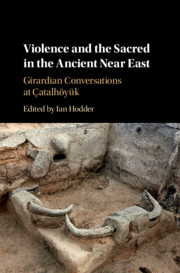Book contents
- Violence and the Sacred in the Ancient Near East
- Frontispiece
- Violence and the Sacred in the Ancient Near East
- Copyright page
- Contents
- Figures
- Tables
- Contributors
- Preface
- Part I Introduction
- Part II Violence and the Sacred
- Part III The Dialectics of Mimesis
- 7 Mimetic Theory, the Wall Paintings, and the Domestication, De-domestication, and Sacrifice of Cattle at Çatalhöyük
- 8 The Ordeal of the Town
- 9 Stretching Girard’s Hypothesis
- 10 Girard’s Anthropology vs. Cognitive Archaeology
- Part IV Conclusion
- Index
- References
10 - Girard’s Anthropology vs. Cognitive Archaeology
from Part III - The Dialectics of Mimesis
Published online by Cambridge University Press: 04 March 2019
- Violence and the Sacred in the Ancient Near East
- Frontispiece
- Violence and the Sacred in the Ancient Near East
- Copyright page
- Contents
- Figures
- Tables
- Contributors
- Preface
- Part I Introduction
- Part II Violence and the Sacred
- Part III The Dialectics of Mimesis
- 7 Mimetic Theory, the Wall Paintings, and the Domestication, De-domestication, and Sacrifice of Cattle at Çatalhöyük
- 8 The Ordeal of the Town
- 9 Stretching Girard’s Hypothesis
- 10 Girard’s Anthropology vs. Cognitive Archaeology
- Part IV Conclusion
- Index
- References
- Type
- Chapter
- Information
- Violence and the Sacred in the Ancient Near EastGirardian Conversations at Çatalhöyük, pp. 209 - 232Publisher: Cambridge University PressPrint publication year: 2019



